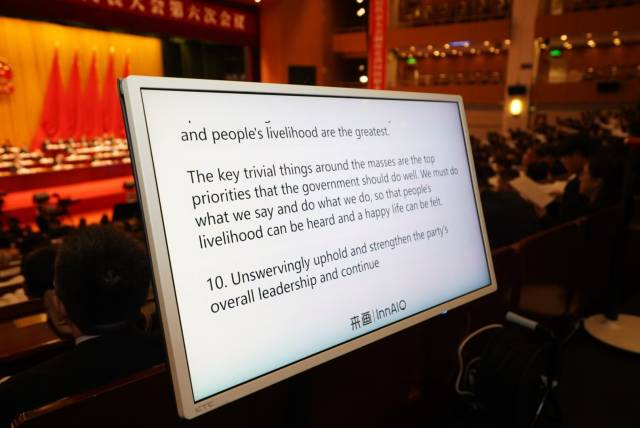News + Events
News + Events
- November 10, 2025VRSTATE Professional Virtual Humans Debut at Taipei Information Month, AI x Metaverse Empowers All Industries
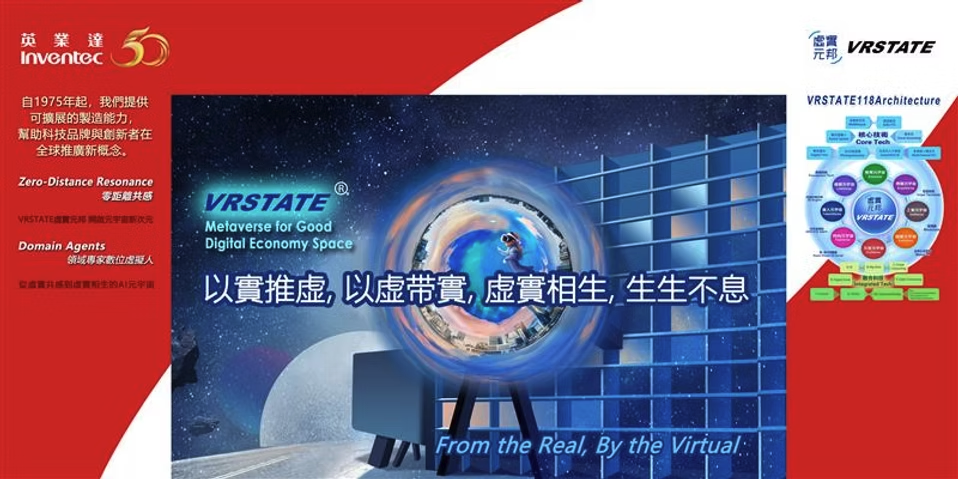
VRSTATE, Inventec's metaverse brand, participated in this year's Taipei Information Month. Based on its development philosophy of promoting the virtual through the real, and the real through the virtual, with the virtual and the real mutually reinforcing each other, VRSTATE highlighted its upgraded "Domain Agent Pro" series of professional virtual human products, including the VRSTATE Guide, VRSTATE Fashionista, and VRSTATE Health. VRSTATE aims to continue playing a leading role in innovation, bringing smarter and more convenient innovative applications to everyone.
- July 27, 20252025 WAIC Cross-Strait Forum: Jointly Researching Artificial Intelligence Layout and Looking Forward to Practical Exchanges
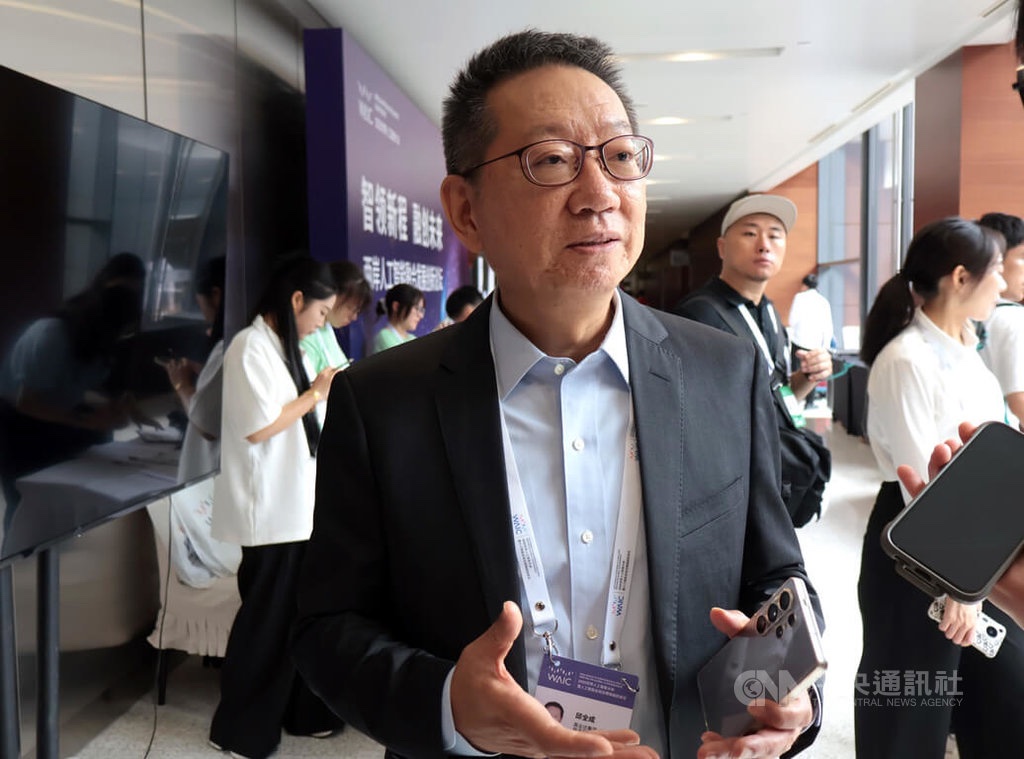 Chiu Chaucer, General Manager of Inventec Corporation (Beijing) Electronic Technology Co., Ltd., giving sideline interview. Photo by Li Ya-Wen, CNA, Shanghai
Chiu Chaucer, General Manager of Inventec Corporation (Beijing) Electronic Technology Co., Ltd., giving sideline interview. Photo by Li Ya-Wen, CNA, ShanghaiThe 2025 World Artificial Intelligence Conference (WAIC) Cross-Strait Forum was held this morning at the Shanghai Expo Center. Taiwanese enterprise representatives attending the forum believe it's good to have venues for exchanges and dialogue, and suggest the forum could be organized "more freely" to allow businesses to connect with needed solutions.
The "2025 World Artificial Intelligence Conference and High-level Meeting on Global AI Governance" is being held from the 26th to the 28th (exhibition runs through the 29th). This year's WAIC has established a "Cross-Strait AI Integrated Development and Innovation Exhibition Zone" for the first time, leading to the "Cross-Strait AI Integrated Development and Innovation Forum," where several Taiwanese enterprise representatives participated to present reports on AI-related development issues.
- July 17, 2025Inventec Exhibits at WAIC in Shanghai! Showcasing AI Hardware and Liquid Cooling Solutions with Metaverse as a Highlight
EMS giant Inventec announced on the 17th that the team will participate in the "2025 World Artificial Intelligence Conference" at Shanghai World Expo from July 26 to 29 with its latest servers and liquid cooling innovation solutions. The team revealed that Inventec will not only lead a delegation to exhibit but also showcase its latest servers and liquid cooling innovation solutions at its own booth. Simultaneously, multiple latest "AI application solutions" will be displayed in the Cross-Strait AI Integration Development Innovation Exhibition Area (Strait Economic and Technology Zone), fully demonstrating Inventec's comprehensive layout in both software and hardware in AI, smart healthcare, and metaverse applications, actively assisting industries in embracing digital transformation and intelligent upgrades in the era of large models.
- June 2, 2025Fu Jen Catholic University Collaborates with NVIDIA, MSI, and Inventec’s VRSTATE to Pioneer AI-Driven Fashion Design
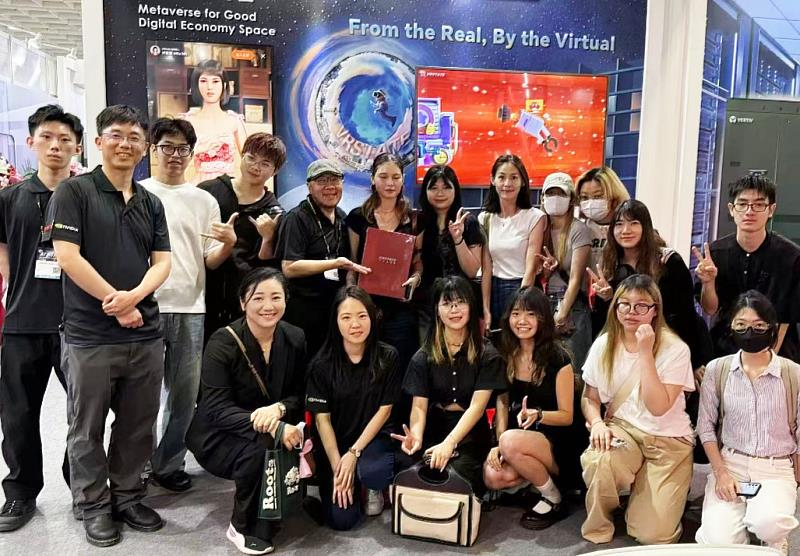 Fu Jen Catholic University faculty and students visiting 2025 Computex, hosted by colleagues from Inventec's Metaverse Technology Division
Fu Jen Catholic University faculty and students visiting 2025 Computex, hosted by colleagues from Inventec's Metaverse Technology DivisionAmid the global wave of artificial intelligence reshaping the fashion industry, Fu Jen Catholic University has taken proactive steps to collaborate with leading technology brands NVIDIA, MSI, and Inventec’s VRSTATE platform. Together, they are building an AI-driven ecosystem for fashion design education and creative innovation, ushering in a new era for AI-powered fashion education in Taiwan.
- May 29, 2025Mila Mii Virtual Online Concert 2025 "You & Mii" to be held in June

"Technology comes from humanity" —— this is a well-known slogan and the best interpretation of Mila Mii's birth. When technology and emotion merge, sparks of virtual and real music fly!
On the VRSTATE platform, Mila Mii's third virtual online concert is about to begin. The setlist matches that of the offline event, featuring 10 amazing performances including the hit songs "One Day", "No Choice", and "Hunksmasher". Combining light-and-shadow effects with motion capture technology, this immersive virtual music festival will bring you an unforgettable experience.
We warmly welcome you to purchase tickets and support Mila Mii! A virtual singer is not just a figure of the future — she is already here, standing right before you.
- May 26, 2025Inventec Launches "AI Virtual Health Manager" and Partners with Asia University to Capture Smart Healthcare Market Opportunities
Inventec, a major contract manufacturer, has taken another significant step forward in its virtual-physical integration technology! Recently, the team collaborated with group partners Inhon and Asia University to integrate their metaverse "Virtual-Physical Integration Space" with the cutting-edge "AI Virtual Human" technology and Inhon's self-developed comprehensive physiological measurement system "Family Treasure," successfully developing the latest "AI Virtual Health Manager" within the Virtual-Physical Integration Space. The team is further introducing it into dozens of care institutions participating in the USR project in the Greater Taichung area, striving to capture the vast business opportunities in smart healthcare through high-performance cloud-based care technologies.
- May 12, 2025Inventec to Showcase 3D Metaverse Photo Frame
Inventec's metaverse strategy is gaining traction. The company is set to unveil its latest technological achievement, the "VRSTATE Metaverse Photo Frame," at COMPUTEX 2025, scheduled from May 20th to 23rd in Taipei. This is Inventec's first display device integrating metaverse technology and 2D-to-3D conversion functionality, targeting enterprise customers to boost sales performance.
- April 8, 2025Youth from Both Sides of the Strait: Gather in Kunshan, Discussing Fashion!
Recently, more than 50 young people from both sides of the Taiwan Strait gathered in Kunshan, embarking on an exciting fashion and creative study tour.
Through industrial internships, employment and entrepreneurship training, cultural design field trips and other forms, they conducted exchanges and interactions around the theme of fashion creativity, enhancing their understanding of the fashion industries on both sides, and injecting new vitality into the integrated development of the fashion and creative industries across the Strait.

- March 23, 2025Promoting the orderly development of virtual reality films and bringing new vitality to Chinese cinema
From silent to sound, from black and white to color, from film to digital, movies have continuously reshaped artistic boundaries through technological iterations. Nowadays, virtual reality technology offers multi-dimensional interactive immersive experiences, making it possible for audiences to "step into" the parallel worlds constructed by films.
The National Film Bureau recently issued a "Notice on Promoting the Orderly Development of Virtual Reality Films," encouraging the exploration of virtual reality film technologies by all parties, improving the full-process supervision from script registration to public screening permits, and injecting standardized momentum into the industry by expanding virtual reality film screening spaces in theaters.
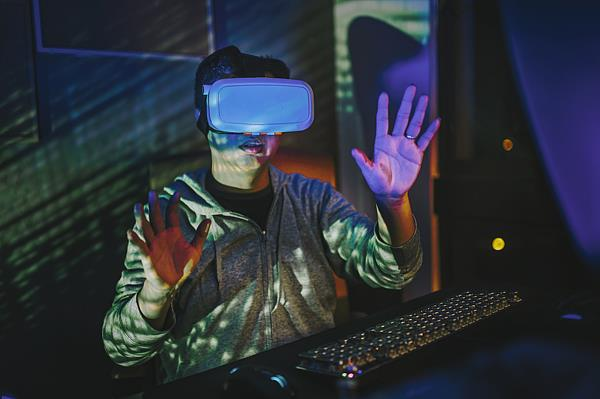
- March 11, 2025Metaverse: Virtual-Real Fusion Creates New Consumption Spaces
This year's government work report proposed to unleash the consumption potential of culture, tourism, and sports.
The metaverse, which integrates the digital and physical worlds, is unlocking new cultural tourism consumption scenarios one by one.
Shanghai has created a metaverse cultural tourism private board meeting, digitizing historical landmarks such as Yu Garden and the Bund. Tourists can "time-travel" to Republican-era street scenes through virtual reality (VR) technology; Gansu has developed an augmented reality (AR) tour system based on Dunhuang murals, allowing tourists to interact with flying apsaras murals by scanning codes; Beijing has seized the opportunity of the renovation and reconstruction of the Workers' Stadium to create the Workers' Stadium Metaverse Center, launching "Digital Football" and Workers' Stadium Metaverse live broadcasts, where tourists can transform into "digital goalkeepers" in the metaverse space and engage in penalty shootouts with international top star digital humans...
By reconstructing time and space through digital technology, transforming cultural and sports resources into interactive consumption assets, the metaverse is unleashing infinite potential in the cultural tourism industry.
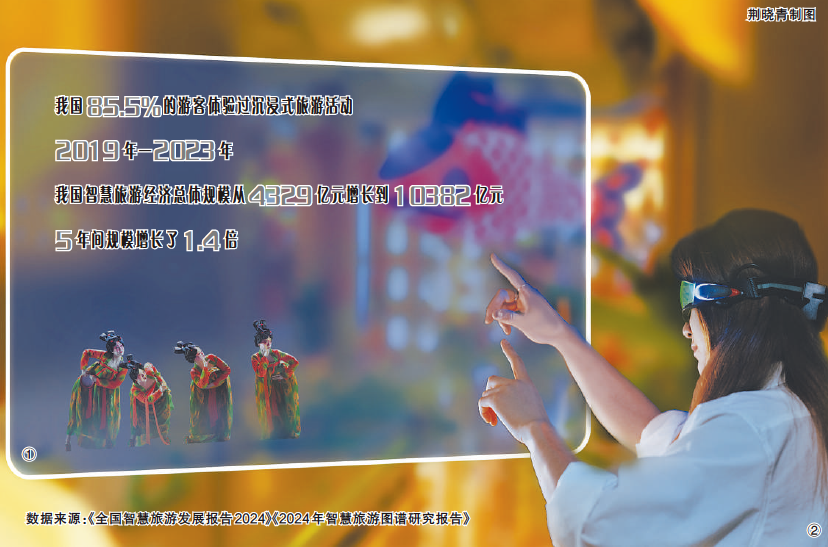 Fig. 1: "Tang Palace Night Banquet" stage photo. Photo by Xinhua News Agency reporter Li Jianan / Fig. 2: A girl using VR glasses. Photo provided by Visual China
Fig. 1: "Tang Palace Night Banquet" stage photo. Photo by Xinhua News Agency reporter Li Jianan / Fig. 2: A girl using VR glasses. Photo provided by Visual China - March 3, 2025Inventec's Metaverse Successfully Commercialized: A Comprehensive Look at the Future of "VRSTATE Platform"
Inventec's metaverse technology has reached a new milestone! The virtual idol singer Mila Mii developed by the group recently held eight ticketed online concerts on the VRSTATE Platform over the weekend, demonstrating the group's capabilities in metaverse applications and marking the official commercialization of its metaverse technology. Inventec's Metaverse Technology Division recently granted an exclusive interview to Economic Daily, unveiling the latest trends, challenges, and future plans for the VRSTATE Platform in 2025. Below is the complete interview transcript:
- February 25, 2025Silent Translator Makes Its Debut! Shenzhen NPC Session First to Use AI Simultaneous Interpretation, Achieving 'Instant Eye Translation'
At the first plenary session and opening ceremony of the Sixth Session of the Seventh Municipal People's Congress held on February 25th, several foreign consular officials were invited to attend. They listened to the meeting through simultaneous interpretation headphones. However, there were no human interpreters present; instead, four screens in front of the consular officials displayed the meeting content translated into English in real-time, shifting many consuls' attention from the printed reports to the screens.
